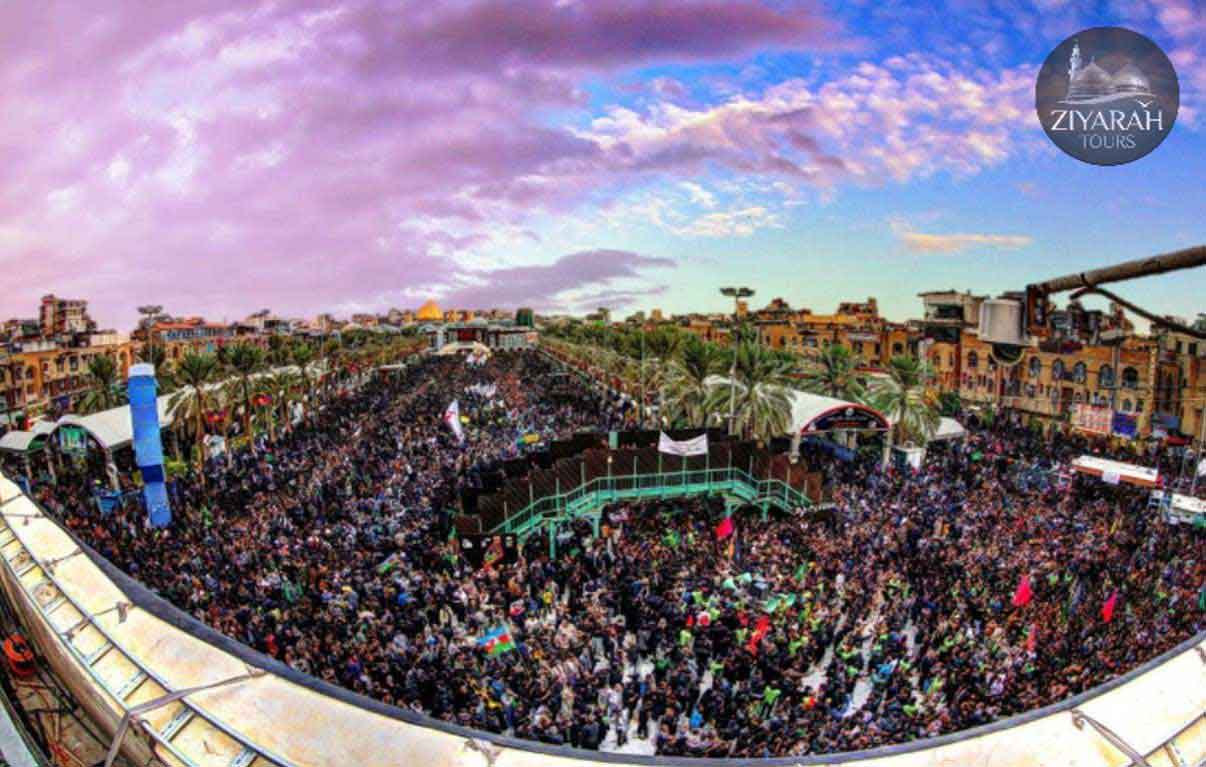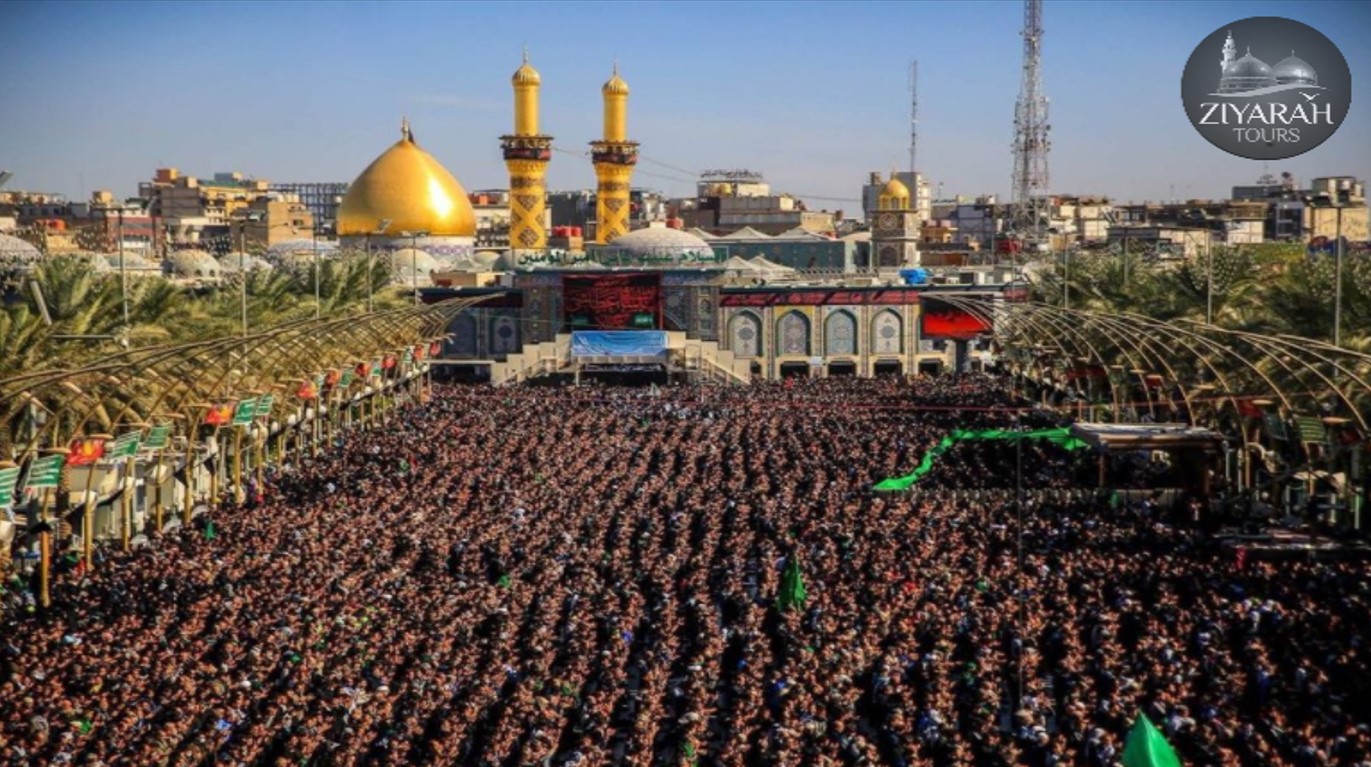
When the rays of the sun fall on the visitor of Imam’s (a.s.) shrines, it consumes his sins like the fire consumes wooden sticks. The sun does not leave any sin on his body and he returns home sinless. In fact on his return he is granted a status that is not even given to those who shed their blood in Allah’s path. (Behaarul Anwar, vol 101, pg 15, tradition 14; Kamiluz Ziaraat, pg 298)
Imam al-Sadiq (‘a) is reported to have said: “Surely when a person comes out to visit the grave of al-Husayn (‘a), for the first step that he takes when leaving his family, his sins are forgiven; thereafter for every step that he takes, he is sanctified until he comes to the grave. When he reaches al-Husayn’s grave, Allah Whispers to him, and Says: My Servant, ask Me, and I shall give you.
When the visitor leaves the house, each and every spot that he steps on, prays for him. (Behaarul Anwar, vol 101, pg 15, tradition 14)
On the Day of Judgment the visitor of the tomb of Imam Husain (a.s.) would intercede for a hundred thousand persons all of whom would have been condemned to Hell. [References: Mikyalul Makarim, Volume 1, page 546]
When a Shia knows Imam Husain’s (a.s.) right over the people and leaves his house for Imam’s (a.s.) ziarat in this condition, without any pride and conceit, then a 1,000 angels accompany him from the right, with another 1,000 angels on the left. And he will be rewarded as if he has performed 1,000 Hajj and 1,000 Umrah with a prophet or with the successor (wasi) of a prophet. (Behaarul Anwar, vol 101, pg 91, tradition)
Allāh (s.w.t.) will write a good deed for one who leaves his house to perform the Ziyarat of Imam Husain (a.s.) on foot and erase a sin from him for every step he takes. Till he arrives at the holy shrine, Allāh (s.w.t.) will write him as one who has achieved salvation and as the successful one. After he completes the Ziyarat, Allāh (s.w.t.) will record him as the successful one. When he decides to return, an angel will come to him and say: “Allāh’s Messenger conveys his salutation on you and tells you that all your previous sins are forgiven. So continue good deeds”. [Reference: Kamiluz Ziyaraat,chapter 49, tradition 1, page 130
The zaair (pilgrim) of Imām Husain (a.s.) turns back (from his pilgrimage) such that not a single sin remains upon him. [Reference: Wasaail al-Shia’h, vol 14, pg. 412]
Imām Ja’far ibn Muhammad al-Sādiq (alayhi salām) said:
“…If the visitor of Imam Husain (alayhi salām) knew how happy he made Allah’s Messenger, Amirul Momineen, Fatima, the Imams (alayhimus salām) and the martyrs among our family and how they pray for him and the rewards prepared for him in this life and Hereafter, he would have wished that his house was at the grave of Imam Husain (a.s.) as long as he lived…”
Imām Ja’far ibn Muhammad al-Sādiq (alayhi salām) said:
“One who performs the Ziyarat of Imām Husain (alayhi salām) has connected with Allāh’s Messenger and with us. It is unlawful to slander him and it is unlawful for Hell to touch his flesh. Allāh will compensate him for every Dirham he spends with ten thousand cities, which will be written for him in a scroll. Allāh will look after all of his needs and everything that he leaves behind will be protected. He will not ask Allāh for anything without Him granting it either immediately or in future.”
Etiquette of Ziyarah
Zawwar (visitors) hold a very special place in the eyes of our Imams. Since people of different mentalities and backgrounds are there. It is very likely that there are differences of opinions or sometimes things may not be as planned or promised. These are little tests of patience. Imam wants us to be humble, patient and compromising and learning to be selfless in this journey. It’s kind of a training workshop. Respect other zawwar, and help them as helping the guests of Imam is like helping the Imam himself. (Huge reward). Feel the presence of Imam. Although he can always see us but in such places we feel the proximity towards him. Think of yourself as the speaker on the stage on whom the spotlight is focused. That how can we be careful of ourselves, as the places even outside of the premises are holy and revered. It’s recommended to recite the idhn e dkhool before entering each time you go. Whilst it is preferable to recite the permission to enter in Arabic, it is not necessary to recite it in Arabic. You can recite it in your own language and then enter.







